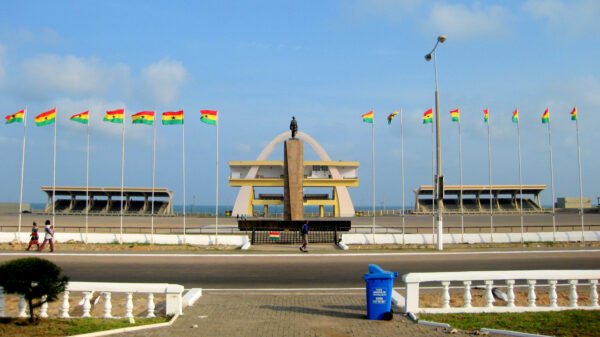Staff writer Guillaume Antignac explains why Sub-Saharan Africa presents an opportunity which must be capitalised upon in the context of climate change.
It was the novelist Rudyard Kipling who once said, “One cannot resist the lure of Africa.” During his time, this statement was certainly not false. It was a kind of kleptomania that urged imperial powers to seize and divide the continent amongst themselves. Although time has since changed things, throughout Africa’s independent history, as Mr Kipling suggests, there has nevertheless been an incessant need for global powers to return their desires to the lands of Africa. In the last decade, sub-Saharan Africa has seen increasing investment and support from China, the European Union, Russia, and the United States. There is a new scramble for Africa, and unlike last time, its countries have much to gain.
Africa is rich in minerals and resources and hosts an increasingly integral part of the world’s population. The continent holds, amongst many, large reserves of Cobalt, Platinum, Uranium, Lithium and Bauxite. Holding these assets within its borders, it stands as an emerging industrial power and an important part of the geopolitical world. Yet aside from the riches African countries can provide for foreign investment, it is its critical role in the looming climate crisis that could bring fortune from faraway lands.
In 2021, the European Union launched a project which aims to gather up to €300 billion for investment around the globe to support infrastructure developments, of which half will go to Africa. The core focus of this project is to boost development in the energy and digital sectors, as well as climate adaptation. Last January, the EU invested more than €280 million in grants to South Africa, with the goal of incentivising investment and promoting green infrastructure.
Germany is especially keen to alleviate its country’s dire energy supply. Since its divorce from Russian gas, the country has desperately sought to diversify its sources. Around last Christmas, Economy Minister Robert Habeck, along with KfW, the German state-owned development and investment bank, were holding discussions with the Namibian Government on investing €10 billion in a large-scale energy plant which would produce Green Hydrogen; a new, completely carbon neutral source of energy.
Green innovations can be seen in examples such as the Kenyan social enterprise Majik Water, a company which transforms air moisture into drinkable water through solar power, or Anglo American, one of the world’s largest mining corporations, which unveiled a prototype of a hydrogen powered mine haul truck, now set to drastically reduce the carbon footprint of its mines.
These kinds of projects are indicative of a general mindset in industrialising African nations. Commonly called ‘industries without smokestacks’, instead of promoting environmentally damaging business, many countries look towards tourism, horticulture, and most prominently a thriving tech industry to boost economic growth. Emitting just 2% of the world’s greenhouse gasses yet being the region of the world that is said to be affected most by global warming, many African businesses are aware of the increasing seriousness this subject demands. And as a continent that is emerging in the wake of this reality, decarbonising young industries is less complicated.
‘Leapfrogging’ can be seen in Africa’s rapid off-grid energy development which, using solar and wind power, is emerging as an alternative to on-grid energy infrastructure. It also opens the opportunity for companies to profit from carbon offsetting, since Africa is a large Carbon Sink– both ecologically, and financially. Thanks to its industrialisation path, and climate, Africa becomes a test market for climate resilient approaches, providing a model for the future, and completely reinventing the relationship it has with the world.
However, the journey is not devoid of obstacles. As ever, Africa is a geopolitical playground mired with corrupt entrepreneurial corporations, insurgent fundamentalist gangs and powerful global forces. China is a big investor in African infrastructure projects. The Wangkang Coorporation, for example, which has set up ceramic factories across Nigeria, Ghana, Tanzania and Uganda, is supported by the National Development and Reform Commission (NDRC) of the Chinese government. Ultimately, this attracts rivalry with the US, which makes Africa the host of a conflict it likely deems frivolous since becoming a sphere of influence between the US and China should not be a concern for African nations. Chinese business is also deceptive – there have been multiple reports of indebting countries with assets, they eventually seize control of. France’s retreat from the Sahel region has left a vacuum for the infamous Wagner Group, and Russian diplomacy is strong in South Africa, which respects the nation for its anti-western stance. And this is not to mention the corrupt and authoritarian politics which, though improving, many African nations still suffer from today.
From a climate perspective too, the high demand for resources unfortunately outweighs that for green energy. For example, Total Energies, the multinational oil company, has recently been contracted by the Ugandan government to build an oil pipeline linking Kabaale in southern Uganda and the port of Tanga in northern Tanzania. Uganda is hoping to transform its untapped oil reserves into 190,000 barrels of the climate destroying substance a day (roughly 0.1956% of the world’s daily consumption). Total Energies insists that the project plays a key role in its ambition to achieve net zero by 2050, highlighting the social and environmental awareness and aid associated with this project. Despite this, the project has fallen under heavy criticism for contributing to oil extraction levels, which in the eyes of many are already alarmingly high. It is of course an opportunity for Uganda to gain a profit from the valuable resources it holds, yet in light of the effects this could have on the environment, it’s a step in the wrong direction.
There is therefore, despite much promise for a green Africa, the need for support from its global partners. Both France and Germany have expressed their desires for collaborative, mutually beneficial relations in a new approach to overcome neo-colonial practices. Only time will tell whether their words heed the cause, but for the sake of the earth’s climate, good results would go a long way.

http://www.wangkanggroup.com/en-us/category_375.html

















